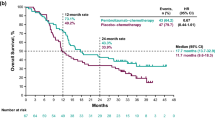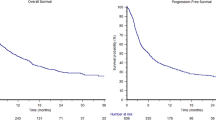Summary
Background/Aims Regorafenib has been approved as a second-line systemic therapy for hepatocellular carcinoma (HCC) patients after the phase III RESORCE trial. This study analyzed real-world data to assess the clinical effectiveness and safety of regorafenib compared to the RESORCE trial. Methods This multicenter cohort study included HCC patients treated with regorafenib after sorafenib (n = 133). We evaluated the time to progression (TTP), progression-free survival (PFS), overall survival (OS), and safety in patients receiving regorafenib along with the predictors of prognosis. Results The median age was 60 years and 81.2% patients were men. Hepatitis B virus infection (68.4%) was the commonest etiology. Most patients were classified as Child-Pugh A (98.5%) and had extrahepatic metastasis (84%) and vascular invasion (45.1%). This study demonstrated similar characteristics apart from more frequent hepatitis B etiology and more vascular or extrahepatic involvement compared with the RESORCE trial. An objective response rate of 12.5% was obtained for response assessment (n = 112); the disease control rate was 34.8%. Thirty-eight patients died during follow-up. With regorafenib, the median OS, PFS, and TTP were 10.0, 2.7, and 2.6 months, respectively. In the exploratory analysis after sorafenib administration, the median OS was 25.8 months. The rate of response and survival were comparable to those in the RESORCE trial. Child-Pugh score > 5, alpha-fetoprotein > 400 ng/ml, and TTP for sorafenib ≥ median were independently associated with OS. Conclusions This real-word regorafenib study showed comparable effectiveness and safety to the RESORCE trial. Regorafenib improves the prognosis of patients with prolonged TTP during previous sorafenib therapy.




Similar content being viewed by others
References
Kibbelaar RE, Oortgiesen BE, van der Wal-Oost AM et al (2017) Bridging the gap between the randomised clinical trial world and the real world by combination of population-based registry and electronic health record data: A case study in haemato-oncology. Eur J Cancer 86:178–185
Bruix J, Qin S, Merle P et al (2017) Regorafenib for patients with hepatocellular carcinoma who progressed on sorafenib treatment (RESORCE): a randomised, double-blind, placebo-controlled, phase 3 trial. Lancet 389:56–66
Zhu AX, Kang YK, Yen CJ et al (2019) Ramucirumab after sorafenib in patients with advanced hepatocellular carcinoma and increased alpha-fetoprotein concentrations (REACH-2): a randomised, double-blind, placebo-controlled, phase 3 trial. Lancet Oncol 20:282–296
Abou-Alfa GK, Meyer T, Cheng AL et al (2018) Cabozantinib in patients with advanced and progressing hepatocellular carcinoma. N Engl J Med 379:54–63
Ogasawara S, Ooka Y, Itokawa N et al (2019) Sequential therapy with sorafenib and regorafenib for advanced hepatocellular carcinoma: a multicenter retrospective study in Japan. Invest New Drugs
Yoo C, Park JW, Kim YJ et al (2019) Multicenter retrospective analysis of the safety and efficacy of regorafenib after progression on sorafenib in Korean patients with hepatocellular carcinoma. Invest New Drugs 37:567–572
Bruix J, Sherman M, American Association for the Study of Liver D (2011) Management of hepatocellular carcinoma: an update. Hepatology 53: 1020–1022
Korean Liver Cancer Study G and National Cancer Center K (2015) 2014 Korean Liver Cancer Study Group-National Cancer Center Korea practice guideline for the management of hepatocellular carcinoma. Korean J Radiol 16:465–522
Facciorusso A, Abd El Aziz MA, Sacco R (2019) Efficacy of regorafenib in hepatocellular carcinoma patients: a systematic review and meta-analysis. Cancers (Basel) 12
Finn RS, Merle P, Granito A et al (2018) Outcomes of sequential treatment with sorafenib followed by regorafenib for HCC: Additional analyses from the phase III RESORCE trial. J Hepatol 69:353–358
Zhu AX, Park JO, Ryoo BY et al (2015) Ramucirumab versus placebo as second-line treatment in patients with advanced hepatocellular carcinoma following first-line therapy with sorafenib (REACH): a randomised, double-blind, multicentre, phase 3 trial. Lancet Oncol 16:859–870
Finn RS, Ryoo BY, Merle P et al (2020) Pembrolizumab as second-line therapy in patients with advanced hepatocellular carcinoma in KEYNOTE-240: a randomized, double-blind, phase III trial. J Clin Oncol 38:193–202
Finn RS, Qin S, Ikeda M et al (2020) Atezolizumab plus bevacizumab in unresectable hepatocellular carcinoma. N Engl J Med 382:1894–1905
Liu X, Qin S (2019) Immune checkpoint inhibitors in hepatocellular carcinoma: opportunities and challenges. Oncologist 24:S3–S10
Han S, Kim DY (2020) Optimal sequence of systemic therapy after sorafenib failure in patients with hepatocellular carcinoma. Clin Mol Hepatol 26:305–308
Lee CH, Lee YB, Kim MA et al (2020) Effectiveness of nivolumab versus regorafenib in hepatocellular carcinoma patients who failed sorafenib treatment. Clin Mol Hepatol 26:328–339
Llovet JM, Montal R, Sia D et al (2018) Molecular therapies and precision medicine for hepatocellular carcinoma. Nat Rev Clin Oncol 15:599–616
Acknowledgements
This work was supported by The GlaxoSmithKline Research Fund of the Korean Association for the study of the Liver. We would like to thank Editage (www.editage.co.kr) for English language editing.
Funding
This work was supported by The GlaxoSmithKline Research Fund of the Korean Association for the study of the Liver.
Author information
Authors and Affiliations
Corresponding authors
Ethics declarations
Conflicts of interest
None.
Ethics approval
All procedures performed in the study involving human participants were in accordance with the ethical standards of the institutional and/or national research committee and with the 1964 Helsinki Declaration and its later amendments or comparable ethical standards.
Informed consent
Since it was a retrospective study, informed consent was waived.
Additional information
Publisher's Note
Springer Nature remains neutral with regard to jurisdictional claims in published maps and institutional affiliations.
Electronic supplementary material
Below is the link to the electronic supplementary material.
ESM 1
(PDF 248 KB)
Rights and permissions
About this article
Cite this article
Lee, M.J., Chang, S.W., Kim, J.H. et al. Real-world systemic sequential therapy with sorafenib and regorafenib for advanced hepatocellular carcinoma: a multicenter retrospective study in Korea. Invest New Drugs 39, 260–268 (2021). https://doi.org/10.1007/s10637-020-00977-4
Received:
Accepted:
Published:
Issue Date:
DOI: https://doi.org/10.1007/s10637-020-00977-4




